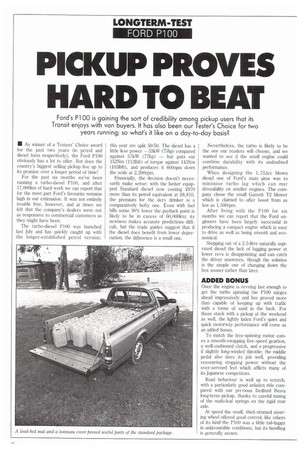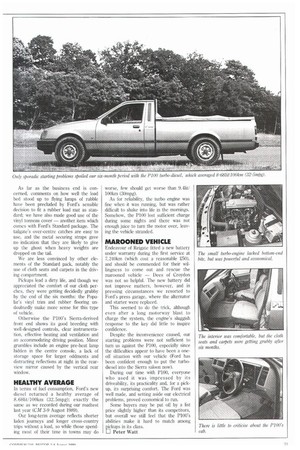PICKUP PROVES ARD TO BEAT
Page 24

Page 25

If you've noticed an error in this article please click here to report it so we can fix it.
• As winner of a Testers' Choice award for the past two years (in petrol and diesel form respectively), the Ford P100 obviously has a lot to offer. But does the country's biggest selling pickup live up to its promise over a longer period of time?
For the past six months we've been running a turbo-diesel P100, and after 17,000km of hard work we can report that for the most part Ford's favourite remains high in our estimation. It was not entirely trouble free, however, and at times we felt that the company's dealers were not as responsive to commercial customers as they might have been.
The turbo-diesel P100 was launched last July and has quickly caught up with the longer-established petrol version; this year are split 50/50. The diesel has a little less power —55kW (75hp) compared against 57kW (77hp) — but puts out 152Nm (1121bft) of torque against 143Nm (1051bft), and produces it 600rpm down the scale at 2,200rpm.
Financially, the decision doesn't necessarily make sense: with the better equipped Standard diesel now costing 970 more than its petrol equivalent at r£8,810, the premium for the dery drinker is a comparatively hefty one. Even with fuel bills some 30% lower the payback point is likely to be in excess of 60,000km; its newness makes accurate predictions difficult, but the trade guides suggest that if the diesel does benefit from lower depreciation, the difference is a small one. Nevertheless, the turbo is likely to be the one our readers will choose, and we wanted to see if the small engine could combine durability with its undoubted performance.
When designing the 1,753cc blown diesel one of Ford's main aims was to minimise turbo lag which can mar driveability on smaller engines. The company chose the small Garrett T2 blower which is claimed to offer boost from as low as 1,500rpm.
After living with the P100 for six months we can report that the Ford engineers have been largely successful in producing a compact engine which is easy to drive as well as being smooth and economical.
Stepping out of a 2.5-litre naturally aspirated diesel the lack of lugging power at lower revs is disappointing and can catch the driver unawares, though the solution is the simple one of changing down the box sooner rather than later.
ADDED BONUS
Once the engine is revving fast enough to get the turbo spinning the P100 surges ahead impressively and has proved more than capable of keeping up with traffic with a tonne of sand in the back. For those stuck with a pickup at the weekend as well, the lightly laden Ford's quiet and quick motorway performance will come as an added bonus.
To match the free-spinning motor comes a smooth-swapping five-speed gearbox, a well-cushioned clutch, and a progressive if slightly long-winded throttle; the middle pedal also does its job well, providing reassuring stopping power without the over-servoed feel which afflicts many of its Japanese competitors.
Road behaviour is well up to scratch, with a particularly good unladen ride compared with our previous Bedford Brava long-term pickup, thanks to careful tuning of the multi-leaf springs on the rigid rear axle.
At speed the small, thick-rimmed steering wheel offered good control; like others of its kind the P100 was a little tail-happy in unfavourable conditions, but its handling is generally secure.
As far as the business end is concerned, comments on how well the load bed stood up to flying lumps of rubble have been precluded by Ford's sensible decision to fit a rubber load mat as standard; we have also made good use of the vinyl tonneau cover — another item which comes with Ford's Standard package. The tailgate's over-centre catches are easy to use, and the metal securing straps gave no indication that they are likely to give up the ghost when heavy weights are dropped on the tail.
We are less convinced by other elements of the Standard pack, notably the use of cloth seats and carpets in the driving compartment Pickups lead a dirty life, and though we appreciated the comfort of our cloth perches, they were getting decidedly grubby by the end of the six months: the Popular's vinyl trim and rubber flooring undoubtedly make more sense for this type of vehicle.
Otherwise the P100's Sierra-derived front end shows its good breeding with well-designed controls, clear instrumentation, effective heating and ventilation and an accommodating driving position. Minor grumbles include an engine pre-heat lamp hidden in the centre console, a lack of storage space for larger oddments and distracting reflections at night in the rearview mirror caused by the vertical rear window.
HEALTHY AVERAGE
In terms of fuel consumption, Ford's new diesel returned a healthy average of 8.68lit/100km (32.5mpg); exactly the same as we recorded during our roadtest last year (CM 3-9 August 1989).
Our long-term average reflects shorter laden journeys and longer cross-country trips without a load, so while those spending most of their time in towns may do worse, few should get worse than 9.41iti 100km (30rnpg).
As for reliability, the turbo engine was fine when it was running, but was rather difficult to shake into life in the mornings. Somehow, the P100 lost sufficient charge during some nights and there was not enough juice to turn the motor over, leaving the vehicle stranded.
MAROON ED VEHICLE
Endeavour of Reigate fitted a new battery under warranty during the first service at 7,240km (which cost a reasonable £50), and should be commended for their willingness to come out and rescue the marooned vehicle — Dees of Croydon was not so helpful. The new battery did not improve matters, however, and in pressing circumstances we resorted to Ford's press garage, where the alternator and starter were replaced.
This seemed to do the trick, although even after a long motorway blast to charge the system, the engine's sluggish response to the key did little to inspire confidence.
Despite the inconvenience caused, our starting problems were not sufficient to
turn us against the P100, especially since the difficulties appear to have been a oneoff situation with our vehicle (Ford has been confident enough to put the turbodiesel into the Sierra saloon now), During our time with P100, everyone who used it was impressed by its driveability, its practicality and, for a pickup, its surprising comfort. The Ford was well made, and setting aside our electrical problems, proved economical to run.
Some buyers may be put off by a list price slightly higher than its competitors, hut overall we still feel that the P100's abilities make it hard to match among &kups in its class.
LJ Peter Watt












































































































